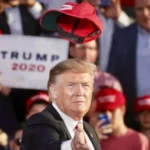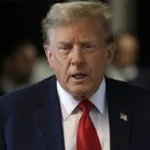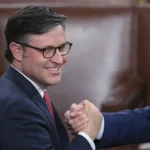Out of the four states where former President Donald Trump’s advisors and inner circle are facing criminal charges for their alleged roles in the scheme to overturn the 2020 election, a new report singles out Arizona as perhaps the toughest jurisdiction for the defendants.
A Friday report by Politico’s Kyle Cheney and Betsy Woodruff Swan described how the Arizona grand jury that indicted 18 defendants in the so-called “fake elector” scheme was given plenty of leeway to pursue any line of inquiry against any defendant, and went even further than prosecutors expected. In the end, jurors indicted 18 people on multiple felony counts, including former President Donald Trump’s White House chief of staff Mark Meadows, his former personal attorney Rudy Giuliani, senior advisor Boris Epshteyn and far-right election lawyer John Eastman (author of the infamous six-page “Eastman Memo“). Trump himself is an unindicted co-conspirator in the charging documents.
Some of the indictments were a surprise even for prosecutors. Politico reported that the office of Arizona Attorney General Kris Mayes (D) told Trump attorneys Christina Bobb and Jenna Ellis that they were not targets of the investigation, only for Bobb and Ellis to be included among the 18 defendants.
Phoenix-based criminal defense attorney Omer Gurion told Politico that it was “pretty unusual” that some defendants went from being told they were not targeted, to being questioned, to being indicted in a span of approximately four days. He said it was possible Jenna Ellis could have sat for an interview and spoke more freely than she may have in other instances, given that she was assured by the attorney general’s office that she wasn’t a target (Ellis ultimately didn’t appear before the grand jury before her indictment).
“I have never seen anything like that in any Arizona criminal case that I can think of,” Gurion said. “Not one.”
Renato Mariotti, a Chicago-based former federal prosecutor, agreed with Gurion that those defendants getting indicted after believing they were not targets of a criminal probe was “bad form” and “something I would never do as a prosecutor.
“That said, I’ve practiced criminal law across this country and gone up against prosecutors of all stripes, and I’ve learned there are many prosecutors who do things I would not do,” he said.
In my over 20 years practicing criminal law, I’ve never encountered someone who was a witness being indicted less than two months later, who was told in writing that they’re a witness and not under investigation,” he added.
One unnamed witness told Politico about a particularly intense questioning that lasted roughly three hours. That witness said jurors displayed “a level of aggression that caught me off guard,” and said one member of the grand jury “seemed to be the leader of the ‘indict them all crowd’ and had ‘pointed but specific questions’ for witnesses. Another witness observed a smaller group of jurors who tried to tone down the questions of their more zealous colleagues, and that they were seen exhibiting behavior like “rolling their eyes, heavy sighing [and] shifting uncomfortably” during the more hard-hitting questions.
All 18 defendants have been charged under all counts mentioned in the charging documents. The 18 Arizona defendants are facing felony charges of conspiracy, fraudulent schemes and artifices (the most serious count) and fraudulent schemes and practices. The defendants have also been charged with felony forgery in relation to the fake elector documents. Charges have also been filed in the Georgia, Michigan and Nevada fake elector investigations.










